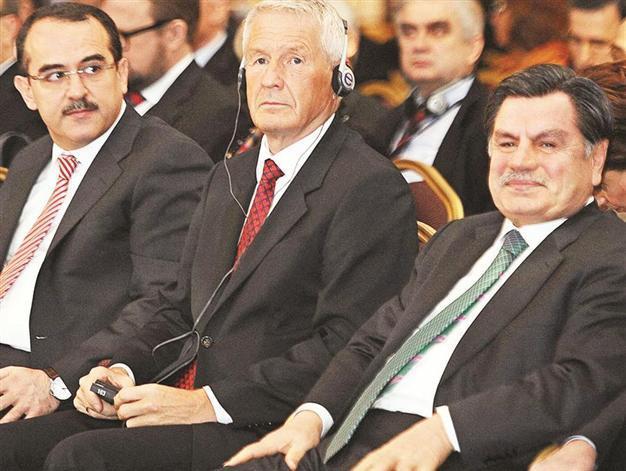European Council throws ball back into opposition's court
ANKARA - Hürriyet Daily News

Justice Minister Ergin (L), Council of Europe Secretary-General Jagland (C) and Constitutional Court chief Haşim Kılıç are seen at a conference in Ankara.
The Council of Europe (CoE) has no legal right to have clear positions on the internal matters of Turkey, rather it is the job of the nation’s opposition to criticize the Turkish government, CoE Secretary-General Thorbjorn Jagland has said.
“There are certainly a lot of things to criticize in Turkey. In a democracy, those who are in power doing wrong things should be criticized and should be scrutinized. And we are doing so regarding the obligations that Turkey has undertaken with the European Convention [on Human Rights],” Jagland said in an interview with the Hürriyet Daily News yesterday, in response to the Turkish opposition’s criticism of European organizations turning a blind eye to the government’s undemocratic practices.
“But we cannot interfere in Turkish domestic politics. It’s the role of the opposition to criticize the government. We cannot interfere in that. The only thing we can do is to [suggest] Turkey implement the legal obligations that it has undertaken when signing the European Convention and other conventions. But I have no legal right, for instance, to have clear positions on internal matters in Turkey.”
Vagueness of terror lawsJagland was in Ankara to attend the High Level Conference on Freedom of Expression and Media Freedom in Turkey that was jointly hosted by the Justice Ministry and the CoE. Jagland described the situation of jailed journalists in Turkey as “worrying,” stressing that journalists’ detention is a result of Turkish anti-terror laws that widely interpret the incitement of violence. “It is sufficient for a journalist to report about a terrorist organization to be associated with that organization immediately. That’s the problem. A journalist has to be able to report everything without being accused of being part of what he is reporting about.”
What Turkey should do is change laws as well as have the judiciary make judgments based on the European Convention on Human Rights and based on the legal practices of the Strasbourg court, the secretary-general suggested. The Judiciary’s much-criticized practices, such as lengthy detentions, are to a large extent due to a culture inherited from the past, Jagland said.
“There’s a basis for interpretation in the laws. Some of them have been changed, I recognize that. It takes time; you need to have the right laws then you need to educate the whole judiciary. That’s why we are bringing judges and prosecutors to the European Court of Human Rights (ECHR) in Strasbourg to learn about the case laws there and what are normal European standards regarding the freedom of expression,” he said. “I recognize things take time but now it’s time to move faster.” Jagland added that results from Turkish judges’ visit to Strasbourg have already been observed, recalling a recent Turkish Supreme Court of Appeals’ ruling that clearly refers to case law of the ECHR. “So some courts have already started to take onboard the new thinking, that’s promising.”
Commenting on Prime Minister Recep Tayyip Erdoğan’s recent statements in which he said Turkey could consider joining the Shanghai Cooperation Organization, Jagland said that he doesn’t think Turkey will leave the European track. “It’s important for Turkey to be a part of Europe and to have the same standards and values; and to be part of the same market. And that’s why it’s important now to also adjust legislation and practices regarding freedom of expression, because it’s a fundamental thing in Europe.”
In laying out his position on the recent “peace process,” Jagland said that Turkish officials’ direct talks with Abdullah Öcalan, the leader of the outlawed Kurdistan Workers’ Party (PKK), is “promising.” “It’s much better to have direct talks then to have mediators, like what happened in Norway.” He also praised the government’s policies regarding the Kurdish issue.
